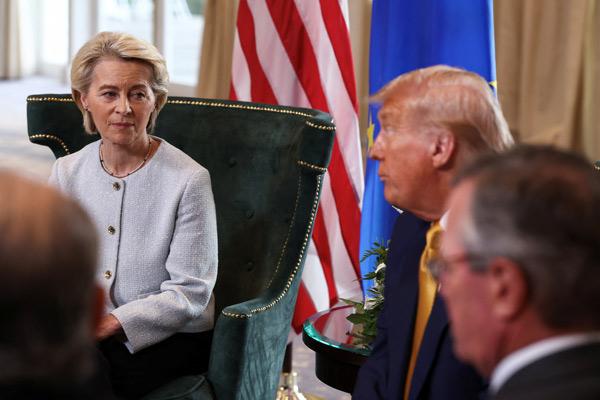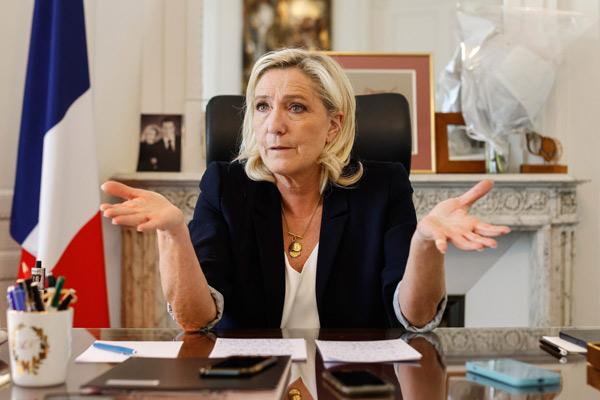

On July 27th, local time, the European Union, harboring a “wait and see” mentality, finally received the new trade agreement between the United States and Europe. However, with almost no support, doubts began to surface.
According to news reports, Bernd Lange, the chairman of the European Parliament’s International Trade Committee, stated that the new US-EU trade agreement is severely imbalanced and harms European interests, representing an unbiased agreement. Several European political figures directly mentioned that the EU’s submission to Trump started in April. Although this new agreement temporarily avoided a trade war, if the EU had taken a firm stance earlier and joined China in countering Trump’s tariff threats instead of choosing compromise, the EU would not have been at a disadvantage in negotiations, potentially securing better conditions.
“The EU should have cooperated with China in retaliation”
Trump’s announcement of “equal tariffs” at the beginning of April caused financial markets to panic, leading investors to sell American assets fearing economic recession. As the selling increased, Trump made concessions, announcing on April 10th that he would temporarily impose only a 10% base tariff on the EU.
However, the EU also yielded. On April 10th, the EU suspended retaliatory tariffs against the United States and accepted the US negotiation proposal under pressure. Unlike China and Canada, which immediately took retaliatory measures causing losses to American consumers and businesses, the EU chose to swallow the bitter pill due to internal divisions among its member states, hoping for a better deal in the future.
On July 27th, in Tan Benli, Scotland, President Trump held talks with European Commission President Ursula von der Leyen.
Trump stated that the EU would purchase energy products worth $750 billion from the United States and plan to invest $600 billion in the US. However, it remains unclear what form and timeframe this investment will take.
Despite European policymakers sighing a sigh of relief at temporarily avoiding a trade war, they harbor regrets: as the world’s largest trading entity, could the EU have secured better terms if it had not initially bowed to Trump?
“He (Trump) is like a bully on campus, and we didn’t stand together against him,” said a diplomat. “Those who did not unite will be defeated one by one.”
Georg Rickerses, a former EU Commission official involved in Brexit negotiations, believes that the EU’s recent threat to impose €93 billion in retaliatory tariffs on American goods was too late.
“Looking back, if the EU had responded forcefully to the US in April, supporting China in countering the US’s tariff hikes, it could have dealt a significant blow to the market and Trump,” said Rickles, a think tank expert at the European Policy Center.
How did the EU gradually yield?
Analysts believe that since Trump returned to the White House, the EU’s response has been too slow. Despite months of preparation by senior trade officials, their plans have now become nothing more than a pipe dream.
They drew upon the strategy used during Trump’s first term, setting out three plans: first, to reduce the trade deficit by buying more liquefied natural gas, weapons, and agricultural products; second, to propose mutual reductions in tariffs on goods.
If these two strategies fail, they will prepare for retaliatory measures and hope for market reactions to the impending trade war or an increase in US inflation, compelling Trump to concede.
However, Trump’s actions were faster than expected, imposing tariffs on steel, aluminum, and automobiles at 25% by March.
At a conference in Luxembourg, several EU trade ministers were prepared to “launch a war” against the United States. A few countries, including Germany and France, urged the European Commission to use the counter-coercion mechanism (ACI), known as the “trade rocket cannon.”
The ACI was implemented at the end of 2023 and has never been activated since. Many consider it a “nuclear option,” with its ideal function being deterrence. The ACI allows the EU’s 27 member states to retaliate against third countries that impose economic pressure on them, forcing them to change their policies. Its scope extends far beyond imposing retaliatory tariffs on American export goods.
However, diplomats have indicated that it is unclear whether most member states agree with this potentially threatening move. The Trade and Economic Security Commissioner of the European Commission, Svetozar Marinovic, called on EU ambassadors to maintain “strategic patience.”
Subsequently, in May, an agreement between China and the US eased investors’ concerns about global trade volatility. Meanwhile, the UK accepted Trump’s base rate tariffs of 10%, encouraging EU member states seeking a settlement with the US, especially Germany.
For months, Germany and Italy have insisted on the EU’s early proposal: if the US lifts all industrial tariffs, the EU will do the same, despite the clear desire expressed by the US for the EU to make concessions unilaterally. Germany is keen on achieving a complex “export offset import” scheme, allowing German car manufacturers to produce and export cars from Europe in the US while enjoying tariff exemptions.
However, when EU technical officials still dreamed of fair competition, Trump had already resorted to any means necessary.
Svetozar Marinovic, the EU Commission Trade and Economic Security Commissioner, has made seven trips to Washington to discuss areas where consensus might be reached, promote the importance of transatlantic relations, and promote the German car “offset” scheme.
Shevchenkovie had more than 100 hours of negotiations with the corresponding officials in the United States, a process that was frustrating.
It is reported that during months of negotiations, Shevchenkovie’s phone would ring frequently, with many European ministers urging him to remain cautious over the phone.
Simon Harris, the Irish Trade Minister, was one of them. He hoped to protect the country’s pharmaceutical, distilled spirits, and beef industries from retaliatory actions by the United States. European business leaders also loudly called for restraint, preferring to accept a decline in profit margins rather than risk tariffs affecting sales volumes.
As a result, the second set of retaliatory measures against the United States was reduced to 72 billion euros, approved on July 24th. Should negotiations fail, both sets of measures would be activated, covering a total of 93 billion euros worth of American products.
The uncertainty in the direction of negotiations over the past months exposed divisions within the European Commission.
Frantz von der Leyen fears confrontation with the United States.
Several European diplomats and officials described Wei Yangde as a tough expert who has consistently advocated for a tougher stance towards Trump and the use of EU retaliatory tools, contrasting sharply with the more moderate approach of the European Commission President Françoise Védrine.
Despite attempts by the French government to protect its companies from retaliatory impacts, it has also repeatedly called for the European Commission to take stronger countermeasures against Trump’s tariffs.
However, Vedrine and her close allies insist that the potential harm of Trump’s additional measures is immense, and the risk of escalating trade wars too high.
They also worry that adopting a more confrontational stance towards the United States could affect other areas.
The dependence of Europe on the security of the United States is another reason for resistance to confronting the United States, especially for Eastern and Northern member states of the EU.
Diplomats stated that due to concerns about Trump possibly not providing military aid to Ukraine, withdrawing troops from Europe, or even exiting NATO, the EU was significantly constrained in negotiations.
An European ambassador candidly stated that the agreement cannot mask the fact that the EU has been crushed by Trump’s crushing strategy. “Trump precisely calculated our pain threshold.”
On April 1st, in Paris, France, Jean-Luc Mélenchon, the leader of the National Rally party in the National Assembly, is pictured. IC Photo
In the eyes of Mariena Le Pen, the leader of the parliamentary group of the far-right National Rally in France, the US-EU trade agreement represents a triple defeat for the EU in politics, economy, and morale, essentially surrendering to the United States.
She wrote on social media X, stating that the EU signed an agreement with the United States under unequal conditions, receiving less favorable terms than the UK. The agreement is comparable to a surrender for French industries, energy, and military sectors.
Bernd Lange, the chairman of the European Parliament’s Committee on International Trade, candidly stated that this agreement is biased. Although a 15% unified tax rate provides some degree of predictability and legal security in trade relations, overall, the agreement has not achieved balance and could potentially cause long-term harm to Europe.
Lange mentioned that the European Commission’s additional $600 billion investment commitment to the United States and its large-scale procurement of American military technology are detrimental to domestic employment and industrial development in Europe. This agreement not only weakens the economic strength of the EU but also mirrors the approach of the Trump administration in using tariffs as a “blackmail” against countries like Japan.